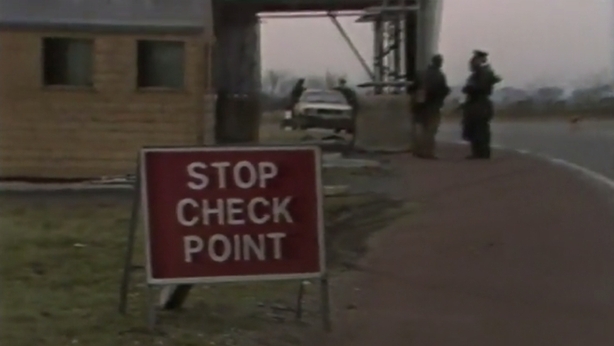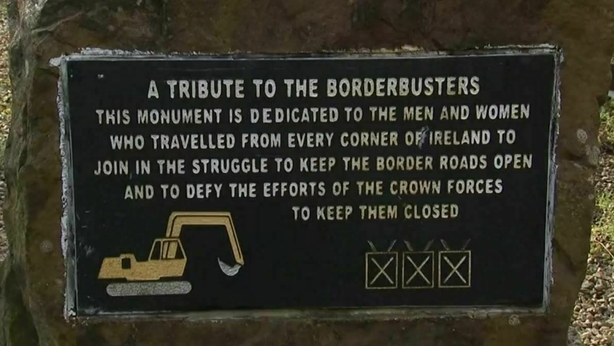Near one of the scores of small crossings on the border, a yellow digger stands as a monument to the lengths communities went to to keep roads open during the Troubles.
Nicknamed the "border buster", it was bought via fundraising by locals for around £3,000 in 1992.
They used it to defy a British army policy of closing or destroying back roads and funnelling traffic through military checkpoints that were in place on major roads until the Good Friday Agreement.
The digger, now on a dais and marked by a plaque, shows why the 500km frontier matters so much in the debate over how Britain leaves the European Union.
'Border buster' legacy highlights opposition to hard border | https://t.co/C4N5rO5Xli #brexit pic.twitter.com/RWsvKSkyTH
— RTÉ News (@rtenews) February 14, 2019
"It developed into a battle of wills," said Dessie McManus, 56, recalling how "men, women and children" spent their Sundays removing concrete barriers or filling in craters just to open the roads up to go to work or church or do their shopping.
"We always felt that we had right on our side."
Ireland, the UK and the EU want to avoid any customs or immigration checks, on what is now an open border, once Britain leaves the EU.
But they are unable to agree on the "backstop" or insurance policy that would rule out a hard border, and the United Kingdom is on course to leave the bloc on 29 March without a deal.

While police on both sides of the border fear any resulting checkpoints could become a target for dissidents, the first spark of disorder could just as easily come from locals going about their business.
McManus, a beef farmer born in Kinawley in Co Fermanagh, but living a short drive across the border in Swanlinbar, Co Cavan, says residents will not stand for any sort of intrusion into the normality they have taken for granted over the past 20 years.
"Nobody wants to countenance the thought of any checkpoints coming back. People wouldn't accept them."
Warnings over dangers of return to hard border | https://t.co/C4N5rO5Xli #brexit pic.twitter.com/Sk1cv1KHRe
— RTÉ News (@rtenews) February 14, 2019
Katy Hayward, a lecturer in sociology at Queen's University Belfast, said: "There is a fear that actually even something that might begin as a peaceful demonstration could be exploited by people who want to stir up violence and tensions within the community."
"This is the environment in which you understand the peace process, that actually people from all different perspectives have felt relatively comfortable in Northern Ireland and this is why we've seen such a decrease in violence."
RTÉ News on social media
Follow us on Twitter
Like us on Facebook
Follow us on Instagram
The economies north and south have become much more interconnected, so a hardening of the border could affect more people, another potential recipe for discord, said Damian McGenity of the Border Communities Against Brexit protest group.
According to InterTradeIreland, the all-island body set up as a result of the 1998 peace accord, cross-border trade in goods has grown at an average rate of 4% a year since the border posts came down.
"There will be immediate uproar," said McGenity, 45, a part-time farmer and postmaster from the Co Armagh village of Jonesborough, which can be reached faster by car from Dublin Airport than it can from the airport in Belfast.
"There's been too much talk of a return to violence. It's more about someone in a car or a truck losing their temper with a garda or a customs official and giving him a punch.
"Then a row starts when that garda needs more protection. That's going to break out all over the place."

For McGenity's neighbours along the eastern Armagh/Louth border, memories of how customs huts transformed into one of the most militarised areas in western Europe are all too real and the return of any kind of hard border inconceivable.
"We well know what it would go back to, and the dangers of that, and it only takes a small spark like the re-introduction of whatever the border manifests itself in," said Declan Fearon,61, chairman of the nearby Dromintee Gaelic sports club.
"We are very concerned about that and we never want to countenance leaving that legacy to our grandchildren."

